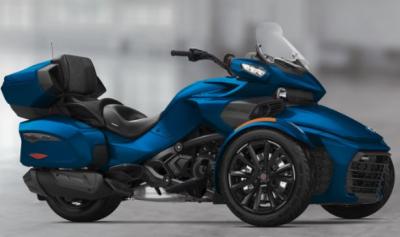|
-
Active Member

 Fuel octane explained. Fuel octane explained.
Before Spyders are made electric we have to deal with gasoline. It's dirty, it smells and it's way too complicated. I never liked chemistry anyway.
I've seen too many erroenous threads and posts here to remain quiet, so here's everything you need to know about "Premium" vs "Regular" gas and which one is right for you.
Long Story Short (very simplified):
1. Modern Spyders run on Premium Gas, or for USA: octane rating of 91 (it's different in every country).
Here's from the owners manual: "Use premium unleaded gasoline with an AKI (RON+MON)/2 octane rating of 91, or an RON octane rating of 95". (See your owner's manual)
Yes, you can run your Spyder on lower octane fuels, but it comes at a cost (see #4)
2. This has nothing to do with how one grade burns hotter than another (it's the same), or how "Premium" is better than "Regular" (it's not)
3. The ONLY reason for this octane requirement is the engine compression ratio. That's it. Nothing more, nothing less. It's all about compression. Simple physics and chemistry.
Higher octane fuels resist to self-combustion due to the heat of the compression. The higher the engine compression, the higher the requirement for octane. Spyder engines have a very high compression ratio (12.2:1 for twins and 12:1 for triples) Any engine with compression over 11:1 has to have a "Premium" gas.
NOTE: I only looked up compression of modern Rotax engines. Yours might be different.
4. To those who run on "Regular" gas: your engine will knock. Here's what you need to know: "Burning fuel with a lower octane rating than that for which the engine is designed often results in a reduction of power output and efficiency. Many modern engines are equipped with a knock sensor (a small piezoelectric microphone), which sends a signal to the engine control unit, which in turn retards the ignition timing when detonation is detected. Retarding the ignition timing reduces the tendency of the fuel-air mixture to detonate, but also reduces power output and fuel efficiency."
5. "Premium", "Supreme", "Plus" and "Regular" terms are completely bogus and misleading. It's all the same gasoline. In fact, most of the gas stations use the same refineries. The difference is in additives. In simple terms: higher octane gas has more expensive additives and lower octane has cheaper additives. "Plus" grade gas is just a mixture of "Regular" and "Premium".
6. A more expensive, high octane fuel does absolutely nothing for the engine designed to run on lower octane fuels, however, a low octane fuel will damage or degrade performance and fuel economy of the engine designed to run on a high octane fuel.
If you want to know more, here's a good video: https://youtu.be/WYlk9C1o0nk
(I'm not affiliated with them in any way)
I hope this helps 
Last edited by Don'tPanic; 12-31-2017 at 07:29 AM.
Reason: Corrections and more info
-
 HIGHER OCTANE USE HIGHER OCTANE USE
I agree with your post. BUTTT I am one to use "premium" when I'm out on the road and it's a habit of mine when it comes to my recreational vehicles. Although the cost is higher, I feel I do get a little extra benefit out of it, especially in the corn states. We do pull a trailer 65% of the time when out on the road and I do notice around 2MPG gain between reg, unleaded and prem. unleaded overall, even when just 2-up riding. So for me that's the benefit I see. As for performance, not much of a "seat of the pants" difference that this old guy can feel. 
-
Very Active Member

 OCTANE & PERFORMANCE OCTANE & PERFORMANCE
Some truth can be found in most lengthy statements ...... What you haven't addressed is load or stress ..... My 1330 has been running on 87 octane almost exclusively ...... However if I was planning to ride with a heavy passenger, while pulling a 400lb trailer, in mountainous terrain I would switch to 91 octane ( for at least 500mi prior to the trip ) . Do you think the anti " knock " feature is activated right after the engine is fired ??? ..... That has not been my experience, but it's your Spyder and your money.... so do what you think is best ......... Mike 
-
Very Active Member

 OCTANE OCTANE
Last edited by BLUEKNIGHT911; 12-30-2017 at 05:51 PM.
-
Very Active Member

 Thanks for the info Thanks for the info
Thanks for the concise run down. I think you explained things pretty well in a short manner. 
 Originally Posted by Don'tPanic

Before Spyders are made electric we have to deal with gasoline. It's dirty, it smells and it's way too complicated. I never liked chemistry anyway.
I've seen too many erroenous threads and posts here to remain quiet, so here's everything you need to know about "Premium" vs "Regular" gas and which one is right for you.
Long Story Short (very simplified):
1. Spyders run on Premium Gas, or for USA: octane rating of 91 (it's different in every country).
Here's from the owners manual: "Use premium unleaded gasoline with an AKI (RON+MON)/2 octane rating of 91, or an RON octane rating of 95".
Yes, you can run your Spyder on lower octane fuels, but it comes at a cost (see #4)
2. This has nothing to do with how one grade burns hotter than another (it's the same), or how "Premium" is better than "Regular" (it's not)
3. The only reason for this octane requirement is the engine compression ratio. That's it. Nothing more, nothing less. It's all about compression. Simple physics and chemistry.
Higher octane fuels resist to self-combustion due to the heat of the compression. The higher the engine compression, the higher the requirement for octane. Spyder engines have a very high compression ratio (12.2:1 for twins and 12:1 for triples) Any engine with compression over 11:1 has to have a "Premium" gas.
4. To those who run on "Regular" gas: your engine will knock (fuel will detonate before the spark). Here's what you need to know: "Burning fuel with a lower octane rating than that for which the engine is designed often results in a reduction of power output and efficiency. Many modern engines are equipped with a knock sensor (a small piezoelectric microphone), which sends a signal to the engine control unit, which in turn retards the ignition timing when detonation is detected. Retarding the ignition timing reduces the tendency of the fuel-air mixture to detonate, but also reduces power output and fuel efficiency."
5. "Premium", "Supreme", "Plus" and "Regular" terms are completely bogus and misleading. It's all the same gasoline. In fact, most of the gas stations use the same refineries. The difference is in additives. In simple terms: higher octane gas has more expensive additives and lower octane has cheaper additives. "Plus" grade gas is just a mixture of "Regular" and "Premium".
6. A more expensive, high octane fuel does absolutely nothing for the engine designed to run on lower octane fuels, however, a low octane fuel will damage or degrade performance and fuel economy of the engine designed to run on a high octane fuel.
I hope this helps 
2022 RT Limited Dark Hyper Silver
2014 RT-S Pearl White
2010 BRP 622 Trailer Pearl White

-
Very Active Member

 Thanks Thanks
Well put. I always use the recommended fuel and knew the difference was in the additives. In south america we had octanes fron 66 on up to 95.. don't know how it is now but we used 66 to strip wax build up from hardwood floor.. don't know how it is now but we used 66 to strip wax build up from hardwood floor..
Gene and Ilana De Laney
Mt. Helix, California
 2012 RS sm5
2012 RS sm5
2012 RS sm5 , 998cc V-Twin 106hp DIY brake and park brake Classic Black
-
Very Active Member


 Originally Posted by Don'tPanic

Before Spyders are made electric we have to deal with gasoline. It's dirty, it smells and it's way too complicated. I never liked chemistry anyway.
I've seen too many erroenous threads and posts here to remain quiet, so here's everything you need to know about "Premium" vs "Regular" gas and which one is right for you.
Long Story Short (very simplified):
1. Spyders run on Premium Gas, or for USA: octane rating of 91 (it's different in every country).
Here's from the owners manual: "Use premium unleaded gasoline with an AKI (RON+MON)/2 octane rating of 91, or an RON octane rating of 95".
Yes, you can run your Spyder on lower octane fuels, but it comes at a cost (see #4)
2. This has nothing to do with how one grade burns hotter than another (it's the same), or how "Premium" is better than "Regular" (it's not)
3. The only reason for this octane requirement is the engine compression ratio. That's it. Nothing more, nothing less. It's all about compression. Simple physics and chemistry.
Higher octane fuels resist to self-combustion due to the heat of the compression. The higher the engine compression, the higher the requirement for octane. Spyder engines have a very high compression ratio (12.2:1 for twins and 12:1 for triples) Any engine with compression over 11:1 has to have a "Premium" gas.
4. To those who run on "Regular" gas: your engine will knock (fuel will detonate before the spark). Here's what you need to know: "Burning fuel with a lower octane rating than that for which the engine is designed often results in a reduction of power output and efficiency. Many modern engines are equipped with a knock sensor (a small piezoelectric microphone), which sends a signal to the engine control unit, which in turn retards the ignition timing when detonation is detected. Retarding the ignition timing reduces the tendency of the fuel-air mixture to detonate, but also reduces power output and fuel efficiency."
5. "Premium", "Supreme", "Plus" and "Regular" terms are completely bogus and misleading. It's all the same gasoline. In fact, most of the gas stations use the same refineries. The difference is in additives. In simple terms: higher octane gas has more expensive additives and lower octane has cheaper additives. "Plus" grade gas is just a mixture of "Regular" and "Premium".
6. A more expensive, high octane fuel does absolutely nothing for the engine designed to run on lower octane fuels, however, a low octane fuel will damage or degrade performance and fuel economy of the engine designed to run on a high octane fuel.
I hope this helps 
You are NOT completely correct with the statement in bold. If there were no provisions within the ECU fuel/timing maps to alter (advance) timing, I would agree with you for the most part. BUUUUT, since there is, the engine can take advantage of more ignition timing with premium fuels than it can with regular. Via the very same "knock sensor" you mention as it WILL cut timing with lower octane.... Therefore, there IS more built in to using premium fuel than CR....
Using an octane higher than what is required will def not gain you anything as you mention but I would use it over regular if I had to choose between them.....
Last edited by hypurone; 12-30-2017 at 06:37 PM.

'15 F3-S Pure Magnesium Metallic - Mad Max Edition
'15 Mclaren 650S Coupe - Aurora Blue
"You Were Really Flyin', When I Passed You Back There!"
Chuck
2015 F3-S , Pure Magnesium Metallic/Steel Black Metallic
-
-
Very Active Member


 Originally Posted by Don'tPanic

Before Spyders are made electric we have to deal with gasoline. It's dirty, it smells and it's way too complicated. I never liked chemistry anyway.
I've seen too many erroenous threads and posts here to remain quiet, so here's everything you need to know about "Premium" vs "Regular" gas and which one is right for you.
Long Story Short (very simplified):
1. Spyders run on Premium Gas, or for USA: octane rating of 91 (it's different in every country).
Here's from the owners manual: "Use premium unleaded gasoline with an AKI (RON+MON)/2 octane rating of 91, or an RON octane rating of 95".
Yes, you can run your Spyder on lower octane fuels, but it comes at a cost (see #4)
2. This has nothing to do with how one grade burns hotter than another (it's the same), or how "Premium" is better than "Regular" (it's not)
3. The only reason for this octane requirement is the engine compression ratio. That's it. Nothing more, nothing less. It's all about compression. Simple physics and chemistry.
Higher octane fuels resist to self-combustion due to the heat of the compression. The higher the engine compression, the higher the requirement for octane. Spyder engines have a very high compression ratio (12.2:1 for twins and 12:1 for triples) Any engine with compression over 11:1 has to have a "Premium" gas.
4. To those who run on "Regular" gas: your engine will knock (fuel will detonate before the spark). Here's what you need to know: "Burning fuel with a lower octane rating than that for which the engine is designed often results in a reduction of power output and efficiency. Many modern engines are equipped with a knock sensor (a small piezoelectric microphone), which sends a signal to the engine control unit, which in turn retards the ignition timing when detonation is detected. Retarding the ignition timing reduces the tendency of the fuel-air mixture to detonate, but also reduces power output and fuel efficiency."
5. "Premium", "Supreme", "Plus" and "Regular" terms are completely bogus and misleading. It's all the same gasoline. In fact, most of the gas stations use the same refineries. The difference is in additives. In simple terms: higher octane gas has more expensive additives and lower octane has cheaper additives. "Plus" grade gas is just a mixture of "Regular" and "Premium".
6. A more expensive, high octane fuel does absolutely nothing for the engine designed to run on lower octane fuels, however, a low octane fuel will damage or degrade performance and fuel economy of the engine designed to run on a high octane fuel.
I hope this helps 
Good information. I am afraid you started something though.  My "usual" comments have not changed since about two months ago. My "usual" comments have not changed since about two months ago.
Last edited by ARtraveler; 12-30-2017 at 06:47 PM.
  Currently Owned: 2019 F3 Limited, 2020 F3 Limited: SOLD BOTH LIMITEDS in October of 2023.
Currently Owned: 2019 F3 Limited, 2020 F3 Limited: SOLD BOTH LIMITEDS in October of 2023.
Previously : 2008 GS-SM5 (silver), 2009 RS-SE5 (red), 2010 RT-S Premier Editon #474 (black) 2011 RT A&C SE5 (magnesium) 2014 RTS-SE6 (yellow)
MY FINAL TALLY: 7 Spyders, 15 years, 205,500 miles
IT HAS BEEN A LONG, WONDERFUL, AND FUN RIDE.

-
Active Member

 Octane Octane
My thought is All gasoline deteriorates. The most purchased gas will always be the freshest gas.
91 octane is recommended but I think the Spyder will run just fine on 87. Also considering different intake air temps
and oxygen levels at higher altitudes, I don't believe 87 vs.
91 octane will make a difference in 100k miles.
I'm sticking with 87.
 .
Monique,
2016 F3t pearl white
Ultimate driver back rest
12v power outlet for batt. tender
Doc Humphries' vibration damper
factory floorboards
added topcase
-
Active Member

 All good points All good points
Thank you for your feedback. Those are all good points.
The engine management and gasoline chemistry is more complicated than can be discussed here, that's why I stressed my oversimplification.
When using 87 octane fuel you're not guaranteed that each and every stroke of the piston will produce a "knock", same with 91 octane fuel - it doesn't guarantee that there will be absolutely no "knocks" - that's why there's a knock sensor and that's why ECU (Engine Control Unit) is made to change ignition timing.
It's all about probability - there's lower probability that "Premium" gas will self-ignite in a higher compression engine under certain stress conditions.
Thanks, and Don't Panic 
-
Very Active Member


You have said what I have been saying for years. But it still does not sink in.
There is one error by ommission in post 1. Not all Spyders require high octane fuel, GS/RS models from 2008 to 2012, the reccomended fuel is reguler because of the lower compression ratio in that series of engine.
Last edited by billybovine; 12-30-2017 at 07:55 PM.

2018 F3 LIMITED
-

I avg. a little better than that. So... I just put fuel in it and turn the key and if it starts, I let the smoke from the rear tire clear from my forward view and PIN IT! And I don't worry about too much until I have to fill up again and then the whole process starts over again. We could debate this, but WHY??
-
Very Active Member


My two cents: because of the EFI system, the Spyder will eat anything you put in it in a pinch.
If you're riding solo and not packing a lot of stuff, you're probably safe using regular. I figure you're not stressing the engine. It might be a different matter if you're riding two-up and/or pulling a trailer. Then a higher octane may be warranted.
Speaking of price savings, I recall the bad old days when the spread between regular, regular plus, and premium was only a nickle each way (e.g., $1.00 vs. $1.05 vs $1.10). A little while back when refueling in Georgia, the spread between regular and premium was almost a dollar. That's a six-dollar per tank difference. 
-
 adding sea foam adding sea foam
does adding afew ounces of seafoam to the tank each fill change the octain rating
-
Active Member

 Sea Foam Sea Foam
 Originally Posted by rustynail51

does adding afew ounces of seafoam to the tank each fill change the octain rating
No. Sea Foam is a detergent and a stabilizer. It dissolves carbon deposits and controls the moisture in the gas. It does not change the octane number, but it does prevent gas deterioration.
You can avoid spending money on fuel detergents by putting Top Tier gas in your tank. Just Google "Top Tier gas"
-

 Originally Posted by Don'tPanic

Before Spyders are made electric we have to deal with gasoline. It's dirty, it smells and it's way too complicated. I never liked chemistry anyway.
I've seen too many erroenous threads and posts here to remain quiet, so here's everything you need to know about "Premium" vs "Regular" gas and which one is right for you.
Long Story Short (very simplified):
1. Spyders run on Premium Gas, or for USA: octane rating of 91 (it's different in every country).
Here's from the owners manual: "Use premium unleaded gasoline with an AKI (RON+MON)/2 octane rating of 91, or an RON octane rating of 95".
Yes, you can run your Spyder on lower octane fuels, but it comes at a cost (see #4)
2. This has nothing to do with how one grade burns hotter than another (it's the same), or how "Premium" is better than "Regular" (it's not)
3. The only reason for this octane requirement is the engine compression ratio. That's it. Nothing more, nothing less. It's all about compression. Simple physics and chemistry.
Higher octane fuels resist to self-combustion due to the heat of the compression. The higher the engine compression, the higher the requirement for octane. Spyder engines have a very high compression ratio (12.2:1 for twins and 12:1 for triples) Any engine with compression over 11:1 has to have a "Premium" gas.
4. To those who run on "Regular" gas: your engine will knock (fuel will detonate before the spark). Here's what you need to know: "Burning fuel with a lower octane rating than that for which the engine is designed often results in a reduction of power output and efficiency. Many modern engines are equipped with a knock sensor (a small piezoelectric microphone), which sends a signal to the engine control unit, which in turn retards the ignition timing when detonation is detected. Retarding the ignition timing reduces the tendency of the fuel-air mixture to detonate, but also reduces power output and fuel efficiency."
5. "Premium", "Supreme", "Plus" and "Regular" terms are completely bogus and misleading. It's all the same gasoline. In fact, most of the gas stations use the same refineries. The difference is in additives. In simple terms: higher octane gas has more expensive additives and lower octane has cheaper additives. "Plus" grade gas is just a mixture of "Regular" and "Premium".
6. A more expensive, high octane fuel does absolutely nothing for the engine designed to run on lower octane fuels, however, a low octane fuel will damage or degrade performance and fuel economy of the engine designed to run on a high octane fuel.
I hope this helps 
I had a neighbor who is a chemical engineer and worked for an oil refinery. He also knows lots about automobiles. The above explaination is exactly how he explained it to me.
-
Very Active Member


 Originally Posted by Don'tPanic

4. To those who run on "Regular" gas: your engine will knock (fuel will detonate before the spark). Here's what you need to know: "Burning fuel with a lower octane rating than that for which the engine is designed often results in a reduction of power output and efficiency. Many modern engines are equipped with a knock sensor (a small piezoelectric microphone), which sends a signal to the engine control unit, which in turn retards the ignition timing when detonation is detected. Retarding the ignition timing reduces the tendency of the fuel-air mixture to detonate, but also reduces power output and fuel efficiency."
Correction: Fuel igniting before the spark ignites is pre-ignition. Knock is the collision of the ignition flame combustion front with the flame front from detonation. Detonation is a part of the air/fuel mixture that spontaneously combusts due to pressure. However, the pressure from compression by itself is not enough to cause detonation. What causes detonation is a part of the air/fuel mixture that is away from the spark ignited flame front is additionally compressed by the increase in cylinder pressure caused by the spark ignited A/F mix burning. Peak cylinder pressure occurs about 16° after top dead center and this is the point that detonation will occur. Detonation can, but seldom does, occur with pre-ignition. When it does the engine most assuredly will be destroyed.
Our Spyders are not suffering from pre-ignition. If they were we would be reading all kinds of posts about engines literally blowing up and pistons melting. But they very well may be suffering from post spark detonation. That's where the knock sensor comes into play. One way to prevent detonation is to retard the spark timing. This gives time for the piston to drop down a bit farther thus reducing the combustion chamber pressure at the point where detonation is likely to occur. As Don'tPanic says, the octane additive increases the pressure/temperature point at which the fuel will self combust. If our engines were detonating we'd probably be hearing it. But the knock sensor compensates for lower octane rating and prevents detonation from occurring. Also, Rotax and BRP aren't going to openly admit it, but the engines may very well be designed to tolerate some level of detonation or knock. Here's one good discussion of these issues: http://www.contactmagazine.com/Issue...ineBasics.html. There are many other articles out there with some variation in the definitions and warnings of damage.
As I said in my thread about mileage vs premium or regular, the only way we will really know what damage is being done, if any, by running lower than specified octane fuel is to dismantle two engines with similar high mileages, one running regular mostly, and the other running 91 octane only. As my graph of MPG shows octane rating has no to very little affect on MPG. http://www.spyderlovers.com/forums/s...ium-vs-Regular

2014 Copper RTS
Tri-Axis bars, CB, BajaRon sway bar & shock adjusters, SpyderPop's Bumpskid, NBV peg brackets, LED headlights and modulator, Wolo trumpet air horns, trailer hitch, custom trailer harness, high mount turn signals, Custom Dynamics brake light, LED turn signal lights on mirrors, LED strip light for a dash light, garage door opener, LED lights in frunk, trunk, and saddlebags, RAM mounts and cradles for tablet (for GPS) and phone (for music), and Smooth Spyder belt tensioner.
-
SpyderLovers Ambassador

 Fuel Fuel
My 2 . USE the Fuel as per the manual.  Happy SPYDER DAY. Happy SPYDER DAY.
-
Active Member

 Yes but Yes but
Technical common sense won't convince people to do anything they aren't already doing . Fuel and lubricant is the first thing we covered in trade school 30 years ago and the only thing that has changed slightly is the technology to adjust ignition timing .... if premium was the same price people would stop arguing that " their bike runs just fine on regular " and likely follow their owners manual. I know with my 2003 Silverado SS it cost me $10 a tank more to run premium ( as per manual) in those 6L engines , but I figured I would take the advise of the engineering people at GM
-

 Originally Posted by BLUEKNIGHT911

Do you think the anti " knock " feature is activated right after the engine is fired ??? .....
There is no "anti-knock" feature......and there is not "octane detector" either.
What there IS is a knock detector.
When it detects a knock, it retards the spark a bit.
IF.....the knock occurs BEFORE the spark hits due to insufficient octane rating of the fuel.......the knock-detector-spark-retard does NOTHING to help that. This is why having sufficient octane is so important.
But yes, if your riding habits don't cause any knock or ping in your engine that you can hear, you probably will be OK.
It is possible, however, that the ping is there and you just can't hear it. If that is the case, the knock detector will retard the max. spark advance a bit and result in slightly reduced performance......and the ping will still be there.
-

 Originally Posted by hypurone

Via the very same "knock sensor" you mention as it WILL cut timing with lower octane....
Not unless there is a knock detected it won't.
-

 Originally Posted by IdahoMtnSpyder

the pressure from compression by itself is not enough to cause detonation.
Our Spyders are not suffering from pre-ignition.
It's all a matter of timing. 
As you pointed out, pre-ignition and detonation are not the same thing.
The heat and pressure of compression CAN cause pre-ignition in almost any engine.
How FAR ahead of the desired ignition point it occurs determines how bad the result will be.
Without some sophisticated equipment you can't really tell if there is a "slight" pre-ignition present or not.
While it would take some unusual circumstances to make it happen, if the pre-ignition occurred way too early damage can result similar to detonation. Like trying to burn gasoline in a diesel engine, for example.
-
Very Active Member

 ANTI-KNOCK ANTI-KNOCK
-
Very Active Member


1. You forgot the MOST IMPORTANT word used PRIOR to the quote: "Use premium unleaded gasoline with an AKI (RON+MON)/2 octane rating of 91, or an RON octane rating of 95," and that word is RECOMMENDED.
4. "To those who run on "Regular" gas: your engine will knock." That is an inaccurate statement as written. It should state, To those who run on "Regular" gas: your engine MAY knock.
I use regular 90% of the time, and NEVER have experienced knocking.
6. There is no EMPIRICAL data that show the use of a lower octane fuel will DAMAGE the 1303 engine! Performance "MAY" be downgraded. I might add I have used Regular in Harley's which also "recommend" 91 and again ONLY performance MAY be altered. No manufacturer to my knowledge has ever stated lower octane will "damage" an engine.
With 52 years of riding, I have never seen so many "obsessed" about such inconsequential stuff as in the Spyder Community.
Each rider must determine for themselves what is best for them and their environment; whether that be tires, tire pressure, oil type and changes, battery life, brake pads, a couple of drops of oil on the pavement, the noise of the fuel pump, the noise of the air suspension, etc. Awareness is a necessity, but people need to WORRY LESS and ENJOY MORE.
Happy New Year!
AJ
 Originally Posted by Don'tPanic

Before Spyders are made electric we have to deal with gasoline. It's dirty, it smells and it's way too complicated. I never liked chemistry anyway.
I've seen too many erroenous threads and posts here to remain quiet, so here's everything you need to know about "Premium" vs "Regular" gas and which one is right for you.
Long Story Short (very simplified):
1. Modern Spyders run on Premium Gas, or for USA: octane rating of 91 (it's different in every country).
Here's from the owners manual: "Use premium unleaded gasoline with an AKI (RON+MON)/2 octane rating of 91, or an RON octane rating of 95". (See your owner's manual)
Yes, you can run your Spyder on lower octane fuels, but it comes at a cost (see #4)
2. This has nothing to do with how one grade burns hotter than another (it's the same), or how "Premium" is better than "Regular" (it's not)
3. The ONLY reason for this octane requirement is the engine compression ratio. That's it. Nothing more, nothing less. It's all about compression. Simple physics and chemistry.
Higher octane fuels resist to self-combustion due to the heat of the compression. The higher the engine compression, the higher the requirement for octane. Spyder engines have a very high compression ratio (12.2:1 for twins and 12:1 for triples) Any engine with compression over 11:1 has to have a "Premium" gas.
NOTE: I only looked up compression of modern Rotax engines. Yours might be different.
4. To those who run on "Regular" gas: your engine will knock. Here's what you need to know: "Burning fuel with a lower octane rating than that for which the engine is designed often results in a reduction of power output and efficiency. Many modern engines are equipped with a knock sensor (a small piezoelectric microphone), which sends a signal to the engine control unit, which in turn retards the ignition timing when detonation is detected. Retarding the ignition timing reduces the tendency of the fuel-air mixture to detonate, but also reduces power output and fuel efficiency.
5. "Premium", "Supreme", "Plus" and "Regular" terms are completely bogus and misleading. It's all the same gasoline. In fact, most of the gas stations use the same refineries. The difference is in additives. In simple terms: higher octane gas has more expensive additives and lower octane has cheaper additives. "Plus" grade gas is just a mixture of "Regular" and "Premium".
6. A more expensive, high octane fuel does absolutely nothing for the engine designed to run on lower octane fuels, however, a low octane fuel will damage or degrade performance and fuel economy of the engine designed to run on a high octane fuel.
If you want to know more, here's a good video: https://youtu.be/WYlk9C1o0nk
(I'm not affiliated with them in any way)
I hope this helps 

2014 RT-S
Akrapovic Exhaust & Cat Bypass
Bajaron Sway Bar w/links / Sena SM-10/Garmin 660
Comfort Seat w Adjustable Backrest
Decals by Purple Harley / Magic Strobe
Kuryakyn Black Widow Pegs Rivco Highway Brackets
Rivco Trunk Mounted Double Flag Holder
FOBO / Spyder Cuff / XM Radio w MC Antenna
Tags for this Thread
 Posting Permissions
Posting Permissions
- You may not post new threads
- You may not post replies
- You may not post attachments
- You may not edit your posts
-
Forum Rules
|





 Reply With Quote
Reply With Quote



 ..... they avg approx. 38mpg .... 190mi. = about 5 gal of fuel ..... 2mpg gain = 10 +/- extra miles per fill ...... at an avg .50 extra cost per gal. = $2.50 .....So $2.50 is what you are spending to go another 10miles further than me .....If my math is wrong please explain ....... Mike
..... they avg approx. 38mpg .... 190mi. = about 5 gal of fuel ..... 2mpg gain = 10 +/- extra miles per fill ...... at an avg .50 extra cost per gal. = $2.50 .....So $2.50 is what you are spending to go another 10miles further than me .....If my math is wrong please explain ....... Mike 
 don't know how it is now but we used 66 to strip wax build up from hardwood floor..
don't know how it is now but we used 66 to strip wax build up from hardwood floor..


 the dang engines will run on anything that they can get to burn; the computer makes sure of that.
the dang engines will run on anything that they can get to burn; the computer makes sure of that. 
 .
.








